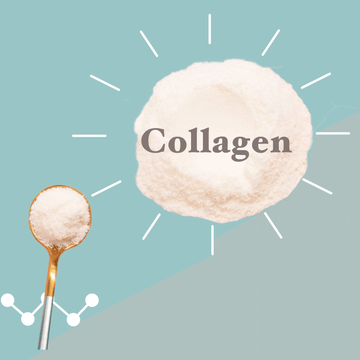
Collagen -- you might have heard of it before; you might even already be using it. But what exactly is collagen and why is everyone talking about it? Here I will break down the ins and outs of collagen and hopefully answer your most burning questions!
What is Collagen?
Collagen is the second most abundant substance in our bodies, after water. It is the principal structural protein in the connective tissues of mammals and is considered the building block for our skin, bones, and tendons. Interestingly, collagen comes from the Greek word “kolla” meaning glue because in our bodies it helps hold everything together. There are many different types of collagen (28 to be exact!), each with a specific purpose. But making up over 90% of the collagen found within us, types I and III are by far the most common. Types I & III collagen are very similar and have complimentary benefits. Type I collagen is the major component of the skin, tendons, organs, and bones; whereas type III is found in our reticular fibres and bone marrow. Both types are fundamental for maintaining the elasticity and firmness of the skin. They work together to help strengthen bones, nails and are found in our arteries, as well. This is why they are often seen together in supplementation, as they complement each other to provide maximum structural support to our bodies.
Another type of collagen that isn’t as common but still offers amazing health benefits is Type II collagen. Type II is found more in the cartilage of joints than in the skin or tendons. It supports our joints and has even been shown to ease the symptoms and regression of arthritis.
Why Supplement with Collagen?
Although our bodies naturally produce collagen, as we age the amounts we produce begin to decrease. Research has found that by the age of 40, the amount of collagen produced decreases to around 40% and by the time we turn 60, it has diminished by almost half (50%). This is why the surface of our skin begins to change. As collagen decreases, our skin thins, we develop wrinkles, crow’s feet, and other age lines.
Although collagen can be obtained from our diet through the consumption of eating meat products like the skin and cartilage of chicken, gelatinous meat and bone broth, typically collagen-containing foods are not a staple in the western diet. This is why many people prefer to take supplementation to boost their intake.
The “Fountain of Youth”
Collagen has often been named the “fountain of youth” for its amazing beauty benefits. Some of the benefits of consuming Types I and III collagen are:
- Improves elasticity and hydrates the skin
- Slows down fine lines and wrinkles
- Supports healthy hair and nail growth
- May reduce hair loss
- Maintains bone density and overall bone health
- Helps to build lean muscle and burn fat
- May aid in weight loss
It’s no wonder why more and more women are choosing to add collagen supplements to their everyday beauty routines for its ability to help diminish the aging process and keep the skin glowing and youthful!
Marine vs. Bovine Collagen
Once you’ve decided to supplement with collagen, it can be a bit confusing to choose which collagen is best for you. At Aura, we offer two different types: bovine collagen and marine collagen. But what’s the difference? For most people choosing between marine and bovine collagen, it is just a matter of preference. For pescatarians or people who don’t eat beef, marine is often the preferred choice. For those who dislike a “fishy” taste, bovine collagen is favoured.
There is a slight difference in the composition of bovine and marine collagen, however. Marine collagen is sourced from fish and is made up of just type I collagen. Bovine collagen contains types I and III collagen. Because of the addition of type III collagen, bovine collagen is better for overall health and recovery from injuries. However, if your priority is to improve the health of your skin, hair, and nails, marine collagen may be the best option for you. Marine collagen may also be better digested, absorbed and distributed throughout your body than bovine collagen, because fish collagen consists of smaller peptides. For the eco-conscious consumers, it is interesting to note that purchasing marine collagen may also be slightly better for the environment. Roughly 11.7 million tons of unused fish parts are discarded annually during processing, so using those neglected parts to make collagen is much more environmentally friendly. On top of that, fish protein in general releases far less greenhouse gas emissions than most meat products.
Is Plant-Based Collagen a thing?
But what about our vegan or vegetarian friends? Can they still get the benefits of collagen without consuming any meat products? Because collagen is exclusively found in animals, it is impossible to find a natural source of plant-based collagen; however, because of recent advances in technology, scientists are now trying to re-create the collagen structure from plant sources like soy, pea and hemp proteins. This new experimentation has lead to many new plant-based collagen products; however, it is uncertain as of yet to whether these new products provide the same benefits as natural collagen from meat or fish sources. It is promising that in the future vegans and vegetarians will be able to acquire the same benefits of collagen as meat-eaters do, yet as of now, the evidence is still lacking.
Although not essential, collagen can provide some pretty amazing benefits to our skin, hair and overall health! Stay tuned next week as we dive into more of the benefits of collagen and, in particular, why women need collagen.
Kirstin Berrington is an AURA Team member with a passion for all things nutrition and health. As a nutritionist, she is equipped with a B.Sc. in Human Nutritional Sciences to help answer all your food-related questions.








